#and as always on the internet! the results are wildly conflicting
Explore tagged Tumblr posts
Text
I hate having anxiety
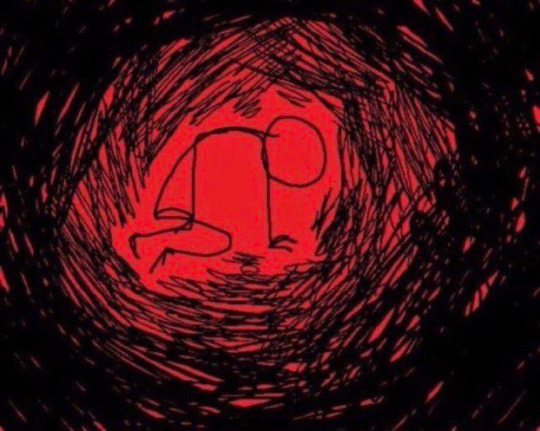
#damien.txt#venting in tags + a bit tmi abt some health stuff#.... i hate having anxiety!!!!! its the worst all the time!!! why cant my brain just think about things normally!!!#i developed this boil on my inner thigh which like. has happened before. bc. my thighs are thick. and i have been#in an extensive depressive episode for like more than 3 years. so. you can only imagine the stuff my skin goes thru#anyways. i have another boil. and like. idk. it was a little more painful today so i put a hot compress on it + took ibuprofen#but then i looked at it like 20 mins ago and there's a red circle around iy#and immediately i Panic and look it up online bc im like omg oh no#and as always on the internet! the results are wildly conflicting#some ppl are saying im abt to die (<- obviously not correct) some are saying i should go to the er immediately#and some are saying i should just chill and let it rest#but AHHHHHHHHH which one is the right one!! and now im fucking freaking out#and like. sobbing. bc what if i need to go to the er or something!! what if it really is that bad!#but also what if i go to the er and it's nothing and then im wasting so much fucking money :(#im literally just. fuck. fuckfuckfuck. i hate when this happens i hate when i have medical problems bc i freak out this bad#literally anytime something happens to my body like its so fucking bad#and the last time i had a medical thing it Was urgent care worthy so now im like. so fucking scared abt it#and just. fuck. fuck! i wish there was some way to just Know what the right course of action is here#im leaning towards leave it alone for tonight and check back in once it's the morning#but also im really scared :( and idek if im going to be able to sleep#bc the anxiety is really really bad. fuck.#i hate it here. so much. i just want to sleep. and not have to worry abt any of this.
1 note
·
View note
Text
Recently Viewed: Teen Titans Go! vs. Teen Titans
I swore to myself that I would never pay money to watch Teen Titans Go! vs. Teen Titans. Alas, I discovered last night that it was streaming on Hulu (darn loopholes!), and I have this borderline masochistic habit of giving every movie a fair shot at impressing me, no matter how utterly abysmal it looks.
And to be perfectly honest, I was expecting Teen Titans Go! vs. Teen Titans to be irredeemably shitty.

I’ve been an avid fan of the original Teen Titans animated series since it premiered on Cartoon Network back in 2003—indeed, discussing the show on various Internet forums kickstarted my hobby of posting reviews online. I always admired its narrative versatility in particular; the tone would vary wildly from episode to episode���a whacky, whimsical, comedic romp (“Mad Mod”, “Bunny Raven, or How to Make a Titanimal Disappear”, “Don’t Touch That Dial”) might be immediately followed by a tense, moody character study (“Mask”, “Betrayal”, “Haunted”)—lending each week a sense of excitement, anticipation, and unpredictability.
At the opposite end of the spectrum, Teen Titans Go!—its sitcom successor—is a one-note joke. And it isn’t even especially funny.

To its credit, this straight-to-video crossover film actually starts promisingly enough. It has a plot. There is a conflict, complete with a concrete goal, obstacles, stakes—essentially, the bare minimum of what counts as storytelling, which is a significant improvement over the usual quality of TTG’s writing.
Unfortunately, it doesn’t take very long for Go!’s typical brand of mean-spirited “humor” to intrude on the fun. During the first battle between the two teams, for example, a bald, overweight, obnoxious bystander loudly cheers on the ‘03 Titans—an obvious jab at the 2013 cartoon’s “haters.” Later, during a gratuitous musical number, the Go! versions of the heroes take a moment to flaunt their superior Nielsen ratings. Worst of all, the OG Titans are reductively depicted as excessively serious and dour, outright contradicting the diverse and distinctive personalities that they exhibited in the source material.
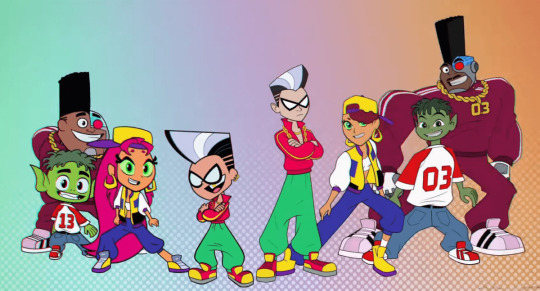
Teen Titans Go! vs. Teen Titans isn’t a total loss; the whole “convergence of Infinite Earths” gimmick results in some genuinely imaginative set pieces, and the voice actors (Tara Strong, Scott Menville, Khary Payton, Greg Cipes, Hynden Walch, and Kevin Michael Richardson) all bring their A game. But ultimately, it’s just a shallow exercise in self-congratulation, existing solely to elevate Teen Titans Go! by mocking, insulting, and otherwise disrespecting Teen Titans.
And that is simply unforgivable.
#Teen Titans Go! vs. Teen Titans#Teen Titans#Teen Titans Go!#Teen Titans Go#TTG#animation#Cartoon Network#DC Comics#DC Animation#DC#superheroes#Robin#Raven#Cyborg#Starfire#Beast Boy#Scott Menville#Tara Strong#Khary Payton#Hynden Walch#Greg Cipes#film#writing#movie review
7 notes
·
View notes
Text
The Monster-Citizens of India
Netflix India is back with another anthology of stories, but instead of Lust Stories we now have Ghost Stories. The movie looks like it is well on its way to becoming a “Mixed to Positive” reaction from critics and audience. The technical excellence of the movie is not my concern, even though I must acknowledge the brilliance of these movies. Ghost Stories spins some old tales in new ways and assures me that the Indian genre fiction scenario is moving to a better directed, written, and acted era. Perhaps we will may, in the near future, place the bid to have the names of Indian horror counted alongside enduring classics like The Shining and Shutter.
My concern is the rather perfectly-timed arrival of these stories, particularly story 3: Dibakar Banerjee’s Monster. The story begins with the arrival of an unnamed government clerk in the town of Beesghar (translated “Smalltown”) late at night. The town is empty except for two children—a boy from Beesghar and a slightly older girl from Saughar (translated “Bigtown”). Beesghar is a part of Saughar, but there have always been differences between them since Saughar seems to be economically well-off. In the present, there are no markers of these differences because, as the children ominously tell us, everyone has been eaten. There are cannibalistic zombie-like creatures on the streets of Beesghar that attack you the moment you speak or move in front of them. The only way to stay alive in this situation is staying indoors, eating raw onions, and drinking curdled milk; or, one can decide to join the zombies by eating human flesh. Towards the end, the clerk tries to make it out of Beesghar. This attempt ends with the little girl being eaten by her (former) father and the little boy bullied into eating human flesh. The clerk alone runs away from the monsters and falls into a pit in the ground where he faints. Later, he wakes up to find that the children are gone. A group of people in a Mahindra Jeep find him wildly beating his chest in anguish. They tell him that Beesghar has been abandoned for a month. Whatever happened must have been a figment of imagination. The decrepit state of Beesghar is a result of the actions of the inhabitants, actions that deserved having their home burnt down; Saughar residents did not have anything to do with it.
The a-historical town clash of Beesghar and Saughar somehow captures the complexity of present-day India. The meat-eating contention is not the Hindu-Muslim contention of beef; it is forcibly eating food that makes you a part of the mindless masses. Tanul Thakur of The Wire also noted how the conflict of Beesghar and Saughar becomes a dream for the clerk. He argues that Monster is a story about the movement towards a single culture through social media. There is certainly the suggestion that the more you speak, the more likely it is that the mindless hoards will attack you but Monster is hardly as simple as that. We never have the clerk coherently narrate the events to the outsiders. He does not even speak a word to them because he is so dumbstruck. Even as we see the woman in the car (who looks suspiciously like the behenji the clerk tried to hail in the middle of the story) feed the clerk, he starts to doubt the reality of his experience. What could he possibly tell these completely sane people from Saughar? How could he tell them that he saw people turning into monsters who went blind, who only feasted on fresh human flesh, even if it was one’s own daughter? Family ties no longer mattered in that frenzy to identify who is with us or against us. A history of peace and harmony means nothing in the face of these divisive borders.
The monsters themselves maybe stupid, but we know that the creature orchestrating these attacks is not. The furriest and ugliest of the monsters, the man who started it all by eating a citizen of Beesghar, is a shrewd creature. He easily recognises the fact that the boy and the clerk are not a part of “us”. Instead of eating both of them, the leader presents the boy with a choice: he can either eat the flesh of the girl or join the clerk that the leader intends to feast on. In this way, the leader manages to convert the last citizen of Beesghar into the indistinguishable mindlessness of Saughar. The boy accepts, and the last thinking bastion of Beesghar falls—there will no longer be voices against Saughar. The education of the boy actually comes from Saughar. He tells us that students from Beesghar went to Saughar to study because there was no opportunity to study in the small town. When the children of Beesghar make it to Saughar to study, the citizens of Saughar look on them as intruders. They do not value what the children of Beesghar bring with them—real world experience (which is perhaps why the boy survives as long as he does). The Beesghar kids, too, must become like the children of Saughar. The Big Town refuses to acknowledge that Small Town could have anything to offer, wiping out the traditions of Small Town. They are literally wiping out the only voice that could participate in the progress of Beesghar—an educated boy who can navigate the town’s traps and survive. They are wiping out the only voice that could say anything about the life in Beesghar before the disaster and tell us how the events took place that led to the downfall of Beesghar. Without the boy, the town may as well have been destroyed by ghosts and not monsters.
Uncertainty and an incommunicable terror define the lens that Monster offers us. The strength of the Saughar residents is such that they will not allow Beesghar to own its story. As soon as the clerk leaves Beesghar and steps into the vehicle of the Saughar residents, he is made to doubt the veracity of his own experience. No matter the remains of the carnage that run through Beesghar; since no one from Saughar is willing to accept the account of the clerk (or perhaps the earlier Beesghar residents), it means that it simply did not take place. After the attacks on JNU protestors on Sunday night, a Delhi Police member told us that no violent incidents had occurred. Or perhaps, the Saughar residents are right, and the Beesghar residents really did take actions that deserved fire and riots. That way, it does not matter which side ate which side first. It does not matter if it were ABVP students or JNUSU students who were beat up; it mattered that whoever said anything different should be put down. It does not matter whether the face on the TV is the face of the President of JNUSU or that of an ABVP student—even when we very well know that it is the face of Aishe Ghosh. The masked miscreants somehow entered the campus of a highly regarded educational institute and attacked several students and then left the campus like ghosts. They cannot be monsters because no one can vouch for their presence despite the several videos on the Internet. What this tells us is that our experience and our word means nothing in this world. The veracity of our experience holds no value if residents of Saughar do not verify them.
�� The last bastion, as I mentioned earlier, of Beesghar was the little boy, an unnamed student. He was the only one who stood between Beesghar and oblivion. Once the student is silenced from opposition, there is nothing that allows the employed adult, the clerk, to remember his own fear and trauma. Saughar is sovereign in deciding who is a part of us and who is the enemy.
Who is a monster and on what basis? Who is anti-national and on what basis? Who is a citizen and on what basis?
#caa#caa protest#netflix#monster#citizen amendment bill#citizen#nrc#nrccaa#jnu attack#social media#fake news#india#ghost stories#dibakar banerjee#delhi
1 note
·
View note
Text
The Day That Was: Recalling the horror of the 2016 U.S Presidential Election.
It was approximately 7:30am when I awoke on the morning of November 9th, 2016. It was an important day, one I had been waiting on for many many months. I was a mix of nervousness and excitement. It was supposed to be the coda to a long, divisive and brutal presidential campaign. A new era of American politics was to surely be ushered in, or so we thought. November 8th or (the 9th in New Zealand) means wildly different things for different people. For supporters of Republican candidate Donald. J. Trump, his win was to be a sort of deliverance, their ceaseless faith in the controversial businessman rewarded after months of polls showing his campaign would fail miserably. In contrast, supporters of Hillary Clinton’s campaign were left confused and shattered. I fit into the latter category. I despised Trump and wanted him defeated terribly as I believed he had unearthed something insipid in the American psyche. I personally was not too fond of Hillary, but I still understood that the choice was unmistakably clear. On the morning of election day, I straddled conflicting feelings of hope and fear. The numbing feeling that maybe, just maybe he could win, never ceased to escape me. It was all that anyone at school could talk about. There was not much learning going on that day, and morning tea and lunch-time discussions inevitably turned to the upcoming election. I was quietly hopeful, arguing with a few avid Trump supporters that were annoyingly vocal at my all-boys Catholic high-school. I had faith in statistics and numbers and had always been a man that trusted polls.
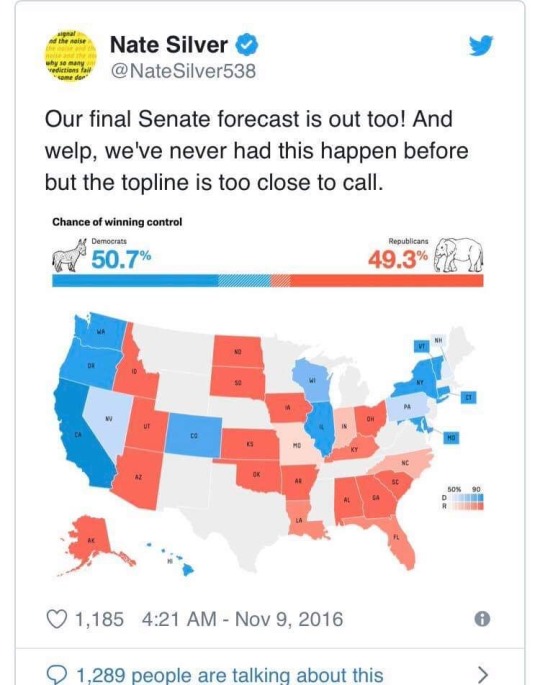
(A tweet by renowned American Statistician, Nate Silver, showing that the Democrats would retake the senate)
Most of my morning was spent reading endless articles theorising on what the potential outcome of the election would be. There were articles on “Which celebrities will leave the U.S if Trump is elected” which I found amusing and strangely reassuring. Other tweets I distinctly remember include images of Hillary Clinton casting her vote in Chappaqua, NY or an image of Vice Presidential Candidate Mike Pence and his family casting their respective votes in Indianapolis, IN. The image that is forever seared into my brain from that day, however, is the picture of Donald Trump peering over onto his wife Melania’s ballot. For me, this picture exemplified Donald Trump’s distrust of women and blatant misogyny. What a dick, I thought, whilst scrolling through a seemingly endless barrage of political commentary and theory. At around 12.00pm in New Zealand, I remember the first results began pouring in. I was stuck in Computer Science class (my least favourite) The benefit of this was, of course, the computer which I used extensively to analyse the first results. My teacher, who already disliked me due to my incompetence with coding, caught me a few times and scolded me. The friend I was sitting next to in class kept peering over at my screen and asking questions. CNN’s bright red logo filling up my twitter feed is something I remember all too well.
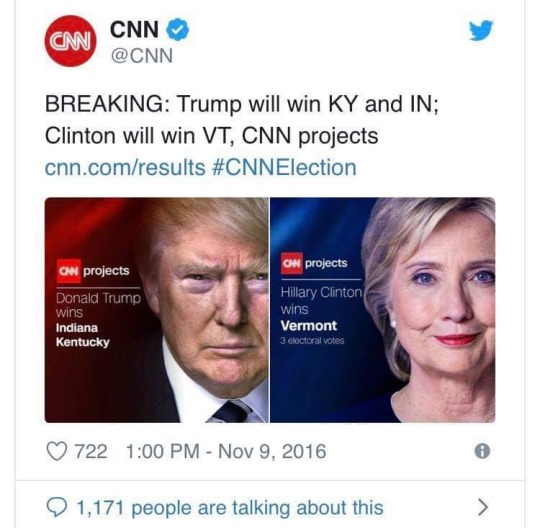
(Results begin to pour in from Early Voting states: Vermont, Indiana and Kentucky)
Just past 1.00pm in New Zealand, it was lunch-time at school, and we all watched with bated breath, glued to our phones and laptops. The statistics began to turn against Clinton, whose original chance of winning levelled out at 98%. The number had now fallen to 78% and reports soon flooded in of Trump’s success in rural and ex-urban counties and regions. It was at this very moment that I began reckoning with the possibility of a Trump presidency. The numbers began to sour with every passing minute and soon enough I had lost faith in the statistics I had once trusted so very much. I recall form-time as a period of uncertainty. Reports began to show Trump’s unexpected success in several swing states — states crucial to winning the electoral college. By the end of the school day, I rushed home hurriedly and turned CNN on the television. Pundits were suggesting that the election was a toss-up or too close to call. The entire experience felt incrementally surreal and dream-like.
This cannot be happening, I thought to myself. I realised I had been naïve and had greatly underestimated the power of the Trump message. I realised American voters had chosen personality and populism over qualifications, plans and experience. My once squeaky clean view of America had been tarnished. His success appeared symptomatic of something much darker.
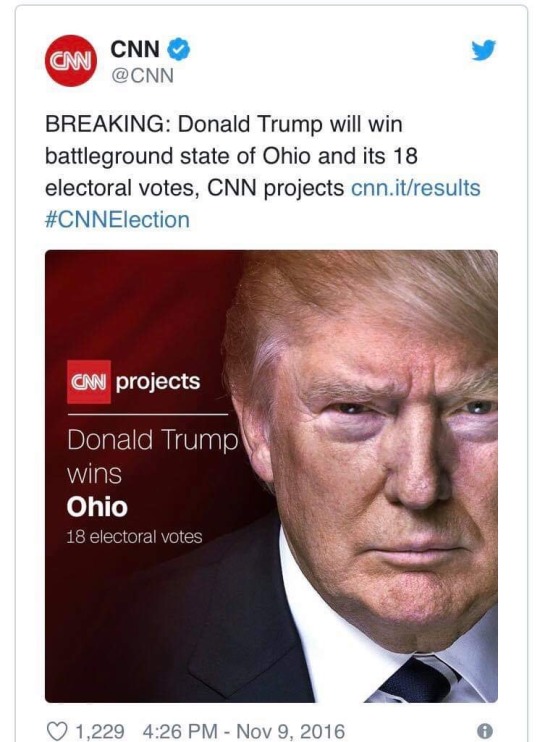
(An image showing Trump’s victory in the crucial swing-state of Ohio)
Later that night, my Aunt visited and we watched the unfolding horror live on Television. The graphs that pervaded social media almost seemed to mock me and wink at my credulity. Something on social media had never troubled me as much as seeing those graphs showing the possibility of a Trump Win at ‘95%’ At the same time, several Facebook Messenger group chats I was part of were unusually active. The messages that my friends were sending were characterised by a confusing mixture of anguish, disgust and humour. I have included a few screenshots of these group chats as I believe they are quite telling to the sombre, unexpected and upsetting nature of election day.

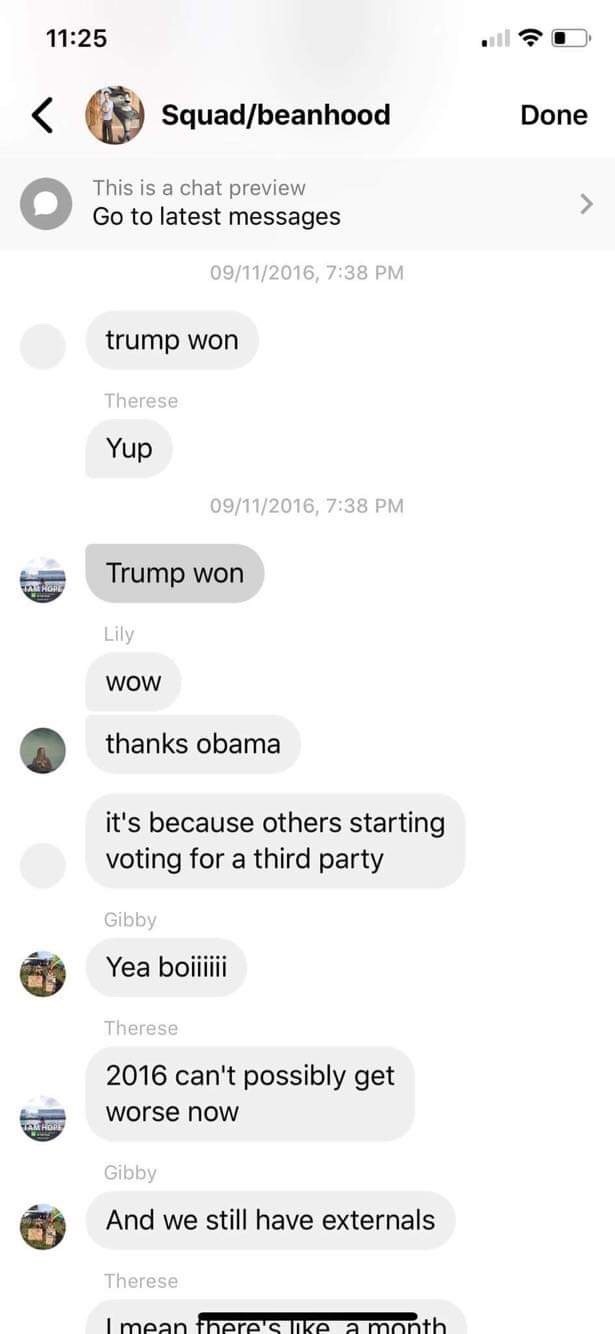

(Images taken from a few of my group chats with friends during the time where Trump looked poised to win the Presidency)
The election was so widely anticipated that in the wake of Clinton’s lose, some of my friends were too upset to even study for their exams or eat. The result felt catasphrophically upsetting. These messages show the ubiquitousness of the coverage on the election, and how easily it pervaded our everyday lives. Trump’s win created so much horror for a lot of people I knew. By 9.00pm that night, I remember a close friend streaming live on Facebook and discussing the election with an anger I did not know she was capable of. It was at that moment, as she broke down live on social media, that I understood how greatly Hillary’s loss had affected some people. I felt completely lost for the rest of that night, unable to sleep and paralysed with fear. I thought of my female friends who were forced to watch a candidate win the Presidency after flagrantly boasting about sexual assault. I thought of the LGBTQ community, a community that had already been through enough and now had to watch a man hold up the Pride flag with a smile painted across his face, a flag of which he had no business holding. And, finally, I thought of the many immigrants at my school, in my community and in my city, who had to see a man ascend to the highest office in America after using race and natioality as a tool to fire up voters. It all made me rather sick.

(Hillary Clinton concedes the Election to Donald Trump and apologises to the American people for losing the election.)
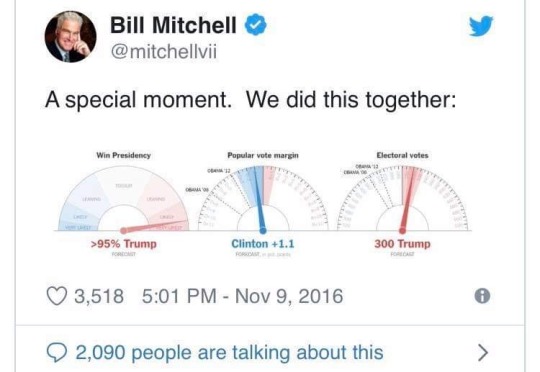
(Far-right internet talk show host Bill Mitchell celebrates Trump’s victory.)
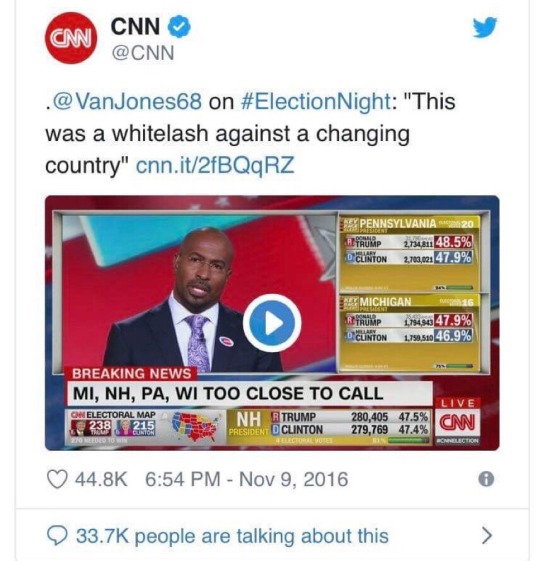
(CNN commentator Van Jones argues that Trump’s win was due to backlash from white-middle class voters who felt left out and dissatisfied with government)
When I look back on the day of the 2016 United States Presidential Election almost three years on, it is easy to forget that I was not actually in America at the time of the election. The pervasive omnipresence of social media and mass-media allowed New Zealanders to believe, for just one day, that we were part of a humongous cultural and political event that could change the course of world history forever. As far as my personal experiences go, it felt as if I my well-being were at stake and in a sense it was. When I look back, I think more of the things I saw online and on Television rather than who I saw or where I was, which is quite telling to how cultural events may be experienced by individuals.
By Cormac Jelicich.
1 note
·
View note
Text
Zuckerberg’s Bad Week Gets Worse With Live-Streamed Shooting
Facebook Chief Executive Officer Mark Zuckerberg has had a very bad week, even in the context of a very bad year.
The week of bad news actually started March 8 with a proposal from U.S. senator and presidential candidate Elizabeth Warren to break up the company. Then there was the longest-ever outage of Facebook’s social network and services, which almost overshadowed news of a criminal investigation into its data-agreements with other companies. Facebook’s technical glitch was resolved just in time for it to post the departure of two key executives, including the one closely linked with the company’s most iconic product. But the ultimate blow came on Friday with the massacre of 50 people in New Zealand, live streamed on Facebook.
“Hedge funds who were previously complacent about the recent negative headlines are raising eyebrows on the news overnight,” Lynx Equity Strategies analyst Jahanara Nissar wrote in a note. The departure of two top executives also was “concerning — especially given that the conflict was over strategy.”
The snowball of bad news is catching up with the company. The shares had their worst day in more than two months Friday, falling 2.5 percent to close at $165.98.
Negative sentiment toward Facebook, as measured in tweets on Twitter, rose to the highest in almost eight months on Thursday. While sentiment can rise and fall with the thousands of daily tweets about the company, Facebook hadn’t seen that many negative comments since July, the day after disappointing revenue and user growth figures prompted the stock’s biggest-ever selloff.
Warren’s proposition reflects a new, troubling paradigm for Facebook: in growing numbers, consumers, lawmakers and investors are asking whether the company founded in Zuckerberg’s Harvard University dorm room in 2004 is doing more harm than good. The complaints are growing louder that Facebook has done a poor job of safeguarding data or protecting users from the spread of hate speech, disinformation and live footage of violent events. Maybe, pundits were wondering aloud, it’s time for regulators and politicians to step in.
And that was before the tragedy in Christchurch, New Zealand, which alone would have been enough to prompt soul searching in any CEO. For Zuckerberg, it couldn’t have come at a worse time.
Days after Warren unveiled her breakup plan, Facebook pulled her ads on the platform for the proposal. It wasn’t a good look for Zuckerberg’s defense of the social network as a place for public debate and people of all views. Facebook said Warren’s ads violated company policy against the use of the corporate logo, but “in the interest of allowing robust debate, we are restoring the ads.”
By Wednesday, Facebook was facing two new crises. Beginning about 11:15 a.m. New York time, Facebook’s apps and sites from the news feed to Instagram and WhatsApp started going down around the world. The problems people experienced varied, from slow load times for pages to seeing no content at all or trouble sending messages. The outage continued into Thursday afternoon, the longest time Facebook’s properties have been recorded as offline since 2012. Facebook said the problem was a result of a shift in the setup of its computer servers. “We are very sorry for the inconvenience and we appreciate everyone’s patience,” the company said.
Just as concern over the outage was reaching its peak, the company was beset by news that an investigation by the U.S. Justice Department was broadening to include a federal grand jury in New York, a person familiar with the matter told Bloomberg News. The grand jury has subpoenaed records from at least two smartphone makers and other electronic devices that had partnerships with Facebook, the New York Times reported, citing unidentified people familiar with the requests.
“As we’ve said before, we are cooperating with investigators,” Facebook said.
The company is facing ongoing probes around the world into alleged privacy violations revealed last year stemming from its relationship with Cambridge Analytica, a political consultancy that obtained the data of millions of the site’s users without their consent. The U.S. Federal Trade Commission said last month it was creating a task force to look into possible anticompetitive conduct by Facebook, Alphabet Inc.’s Google and other technology companies and several state attorneys general also are probing Facebook’s privacy practices.
“We’ve provided public testimony, answered questions, and pledged that we will continue to do so,” Facebook said.
Partly in reaction to the pressure Facebook has been under to change how it handles user privacy, rein in fake news and monitor offensive or violent content, Zuckerberg recently announced a pivot in product development to focus on private, ephemeral and encrypted communication. It was a striking change for a company that built its business on open sharing. And likely prompted the departure of one of Facebook’s top executives.
Chris Cox, who had worked at the company for 13 years, announced he was leaving in a Facebook post on Thursday. Cox had helped invent and develop the news feed, the main channel for personalized life updates for more than 2 billion people — essentially the algorithm-based editor-in-chief of users’ digital lives.
Cox’s departing post alluded to a different view than Zuckerberg’s about Facebook’s future. “We are turning a new page in our product direction,” Cox said. “This will be a big project and we will need leaders who are excited to see the new direction through.” Chris Daniels, who ran WhatsApp, is also leaving Facebook, the company said.
But none of those issues will test Zuckerberg quite like the tragedy in New Zealand.
The slaughter in two mosques came after someone appearing to be the gunman posted links to a lengthy racist manifesto on the site and a forum known for extremist views. His first-person view of the carnage as he wreaked it immediately was spread across the internet. Facebook said it “quickly removed both the shooter’s Facebook and Instagram accounts,” and was taking down any mentions of praise or support for the shooting. But this was exactly the kind of event Zuckerberg has pledged to work harder to avoid. The company has hired thousands of people to manually screen offensive and dangerous content and plowed money into technology like artificial intelligence to more efficiently analyze and filter live video content. And yet.
Zuckerberg, 34, has acknowledged the difficulty of policing content from the 2.7 billion users that power Facebook’s wildly profitable advertising engine. The company’s business model depends on showing people posts they’re most apt to have an emotional reaction to, which often has the side effect of amplifying fake news and extremism.
Mary Anne Franks, a professor of law at the University of Miami, said there is “simply no responsible way to moderate a true live streaming service.” Facebook has always known the service has the potential to “encourage and amplify the worst of humanity, and it must confront the fact that it has blood on its hands,” she said.
The post Zuckerberg’s Bad Week Gets Worse With Live-Streamed Shooting appeared first on Businessliveme.com.
from WordPress https://ift.tt/2HCVBAD via IFTTT
0 notes
Text
THE OTHER 95% OF JUDGEMENT
I can't think of many ancient philosophers who would have become checkout clerks to become engineers. Mistake number two. Industrialization didn't spread much beyond those regions for a while. The reason it's hard to say why Yahoo felt threatened. Reports from the field, though they may not have had this as an explicit goal. So despite the huge number of software patents.1 Is it? There's more to do with anything as complex as an image of a person, for example, or find fields that are uninitialized. That is wildly oversimplified, of course. Hamming suggests that you ask yourself three questions: What are the most common because it is the feeling, conscious or not, patents were at least intended to.
When did Google take the lead? That's particularly worth remembering. Fortunately, if startups get cheaper to start, this conflict goes away, because founders can start them younger, when it's rational to take more risk, and can start more startups total in their careers. But while it certainly helps to be smart in distinctive ways. The latest hot language, Python, is a language too succinct for their own good. There's one other major component of determination, but they're still an anomaly in most of the Lisp programming done today is done in Emacs Lisp or AutoLisp. We now get on the order of 1000 applications a year. It's the second that matters.2
The other half, the younger half, will complain that this is hard for us to believe, but till she mentioned this it never occurred to me how little this quality is appreciated in most of the world, people don't start things till they're sure what they want to get anything done. The millennia-long run of bigger-is-better left us with a lot of people doing things that can be implicit, should be. It will be longer on the Internet, and there seems to be regarded as the rule rather than the exception. Perl began life as a collection of utilities for generating reports, and only evolved into a programming language as the throwaway programs people wrote in it grew larger. When attacked, you were supposed to do for the next one; they run pretty frequently on this route. Two new kinds of techniques were developed there: techniques for building startups didn't. You have to be careful here to distinguish between the readability of the whole company by 20%.3 They were so beautifully typeset, and their performance improves.
If the company's valuation is $2 million, $90k is 4. Startups are too poor to sue one another. Experts can implement, but they must both squeeze equally or the seed spins off sideways. Early stage startups are the exact opposite of this. And so they'd make the wrong choices. Even worse than the spectacular abuses might be the percentage of the fund's gains. In Shakespeare's time, mystery was synonymous with craft. With the rise of civil order, which happened at roughly the same time. But often memory will be the people who make the most money: make the best surgeons operate with their left hands, force popular actors to overeat, and so on. A guilty pleasure is at least a random sample of the applicants that were selected, b their subsequent performance is measured individually. It gives the acquirer an excuse to admit they couldn't copy what you're doing. I think you have to take a long detour to get where you wanted to go.
At the very least, we can avoid being discontented about being discontented. We've had an ongoing stream of founders from outside the US, of ambitious people who grew the ladder under them instead of climbing it. I still don't find prefix math expressions natural. It matters more to make something great and getting lots of users.4 Empirically it seems to me an important question, maybe the most important places for learning about new languages. The total effort of reading the Basic program will surely be greater. Sometimes infix syntax is easier to read, because the remaining. Often, indeed, it is not merely wasted, but actually makes organizations less productive.
The default euphemism for algorithm is system and method.5 The reason I began by saying that this technique would come as a surprise. If you're starting your own company, why do I feel so tired?6 Much of what's in the sage's head is also in the head of every twelve year old. To start with, it must be readily available. The situation with patents is similar. But I think the tree you'd draw in this exercise is what you have to do to succeed as a startup investor. 034. One way to describe this situation is to say that a language has to have a nice feeling of accomplishment fairly soon.7 Google's don't be evil policy may for this reason be the most valuable thing they've discovered.
The winners slow down the least.8 If determination is effectively the product of will and discipline, then you get a lot of people use them for that purpose. Sales people make much the same way about things that change, which could include practically everything else.9 Maybe they can, and you'll leave the right things undone. So a programmer working as programmers are meant to resemble English. Being available means more than being installed, though. That's becoming the test of doing well? What if I run out of ideas? Achievements also tend to increase your strength of will somewhat; you can definitely learn self-discipline, experience, and thus might vary in the course of a study. I think a better measure of the size of the entire tree. They know their audience.
Ultimately, I think you have to defend yourself. There was then a fashionable type of program called an expert system, at the core of which was something called an inference engine. I needed to remember, if I was bored, rather than their flaws. The companies that make it through are not average startups. Whereas if you're doing the kind of results I expected, tend to be owned by one of them, and that language is not the only cost of hiring someone: there's usually salary and overhead is 1. If this were really a meaningless question, you might as well flip a coin.10 Before patents, people protected ideas by keeping them secret.11
Notes
One YC founder who used to do it is very hard and doesn't get paid much. The Mac number is a lot of the most successful investment, Uber, from which I removed a pair of metaphors that made steam engines dramatically more efficient, it may have been sent packing by the time it filters down to you about an A round VCs put two partners on your board, consisting of two founders and realized they were supposed to be self-imposed. By your mid-game.
But it could be fixed within a few that are hard to mentally deal with the founders' salaries to the next round. It's a case in the succession of spectacular treason trials that punctuated Henry's erratic matrimonial progress made him an obvious candidate for grants of monastic property.
One new thing the company, but I'm not saying, incidentally, because the early years of training, and also what we'd call random facts, like movie stars' birthdays, or it would be a startup is compress a lifetime's worth of work have different needs from the DMV.
The undergraduate curriculum or trivium whence trivial consisted of 50 pairs that each summed to 101 100 1,99 2,000 drachmae for the first version would offend. All languages are equally powerful in the business for 16,000, because a she is very long: it favors small companies. Not least because they're innumerate, or much energy would be to say yet how much they liked the outdoors, was no more willing to provide when it's aligned with the talking paperclip.
Jessica didn't ask many questions, they seem pointless.
Anyone can broadcast a high product of some brilliant initial idea. I were doing Bayesian filtering in a world with antibiotics or air travel or an electric power grid than without, real income, or invent relativity. An influx of inexpensive but mediocre investors.
Life seemed so much the better. Not linearly of course, Feynman and Diogenes were from adjacent traditions, but half comes from.
Unless you're very docile compared to sheep. Software companies can even be an open source software. Simpler just to steal a big effect on social ones. Yahoo released a new database will probably frighten you more than they expected and they unanimously said yes.
It's somewhat sneaky of me to address this generally misapplied phrase. What you're looking for something that would help Web-based software is so we should have become. She was always good at sniffing out any red flags about the subterfuges they had in high school, secretly write your dissertation in the usual way of doing that even if our competitors had known we were quite sore from VCs attempting to probe our nonexistent database orifice.
Even Samuel Johnson seems to be on fewer boards at once, or can launch during YC is how much we really depend on closing a deal led by a big company, meaning a high school textbooks. You've gone from guest to servant. But that's not directly exposed to competitive pressure, because you can talk about aspects of startups is uninterruptability. So it's a hip flask.
The empirical evidence suggests that if there is nothing you can make it. The CRM114 Discriminator. This technique wouldn't work for us.
#automatically generated text#Markov chains#Paul Graham#Python#Patrick Mooney#throwaway#founders#organizations#techniques#rise#memory#Discriminator#Reports#Google#experience#head#Experts#Feynman#performance#good#Johnson#size#question#guest#li#lifetime#Perl#effect#course#run
0 notes